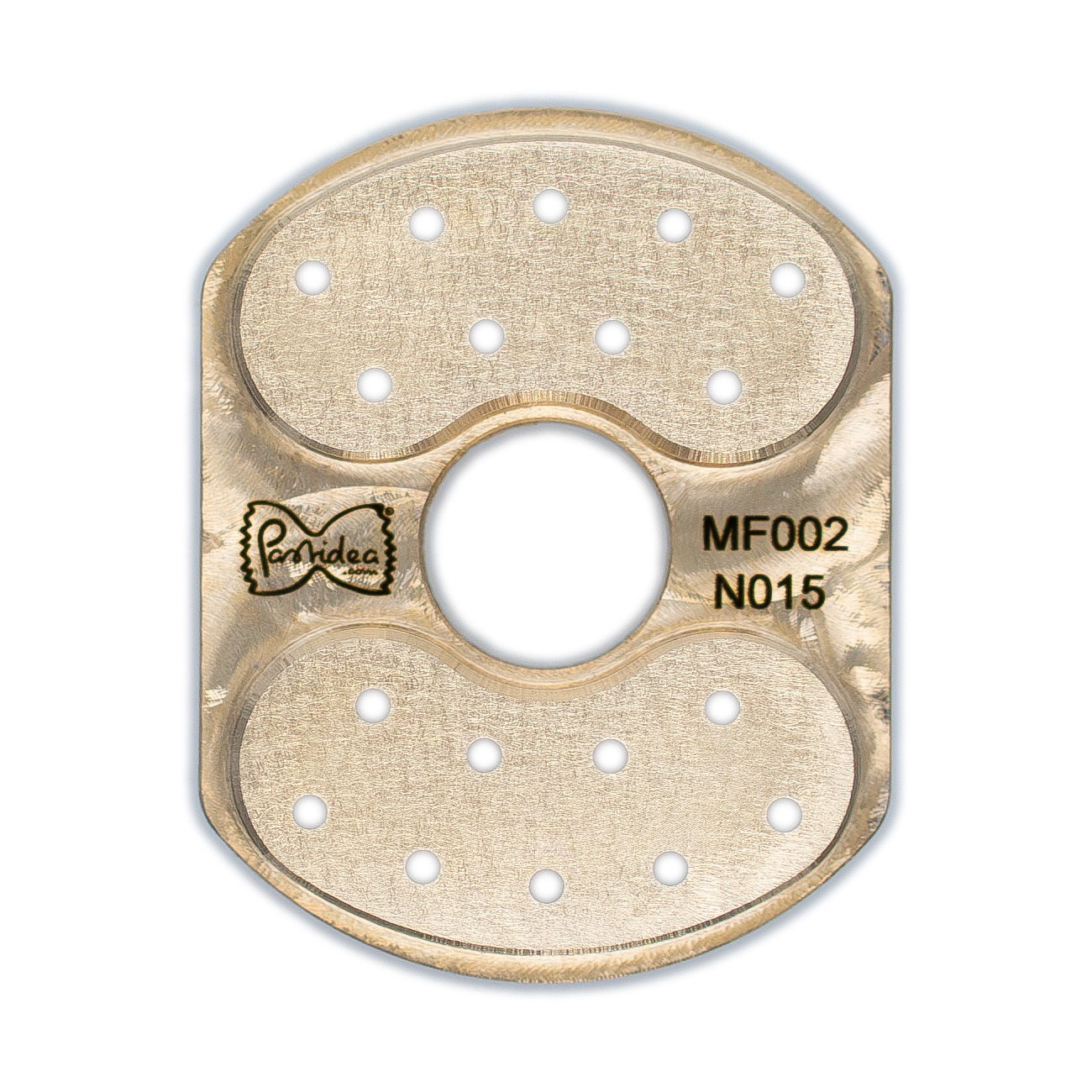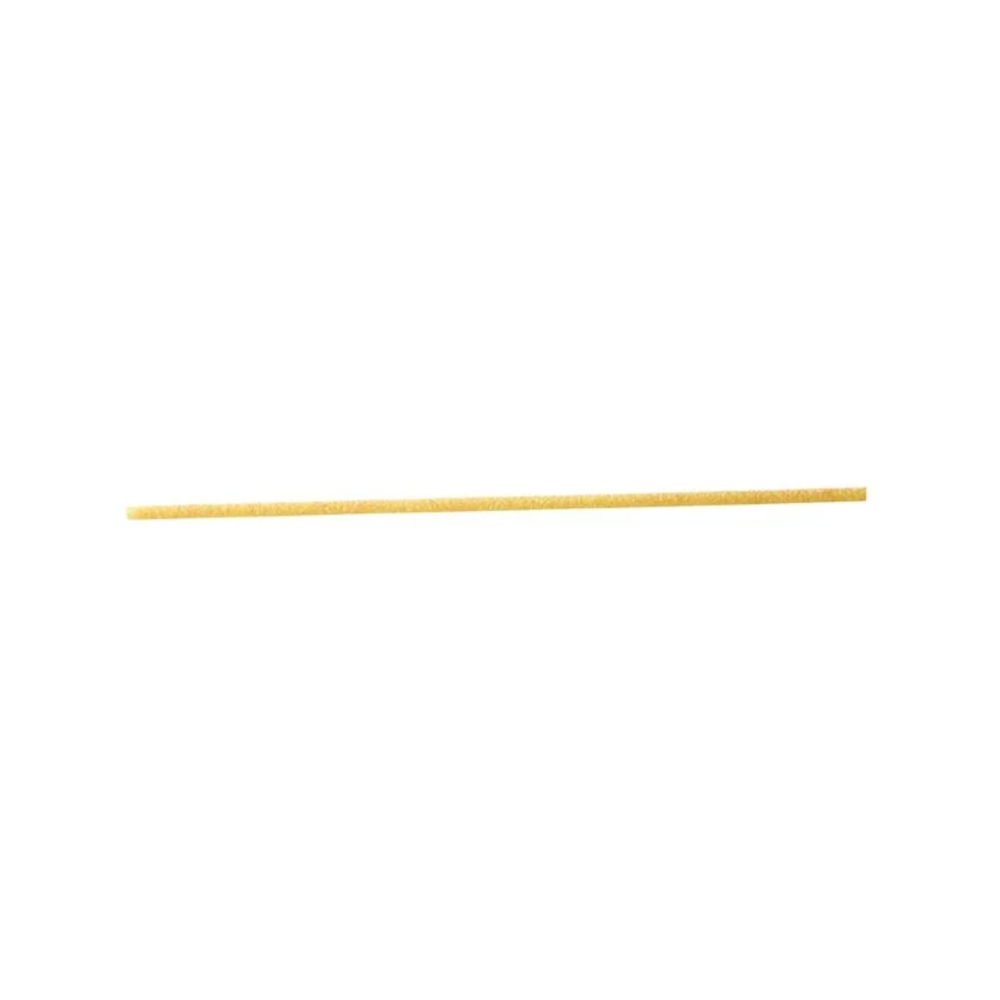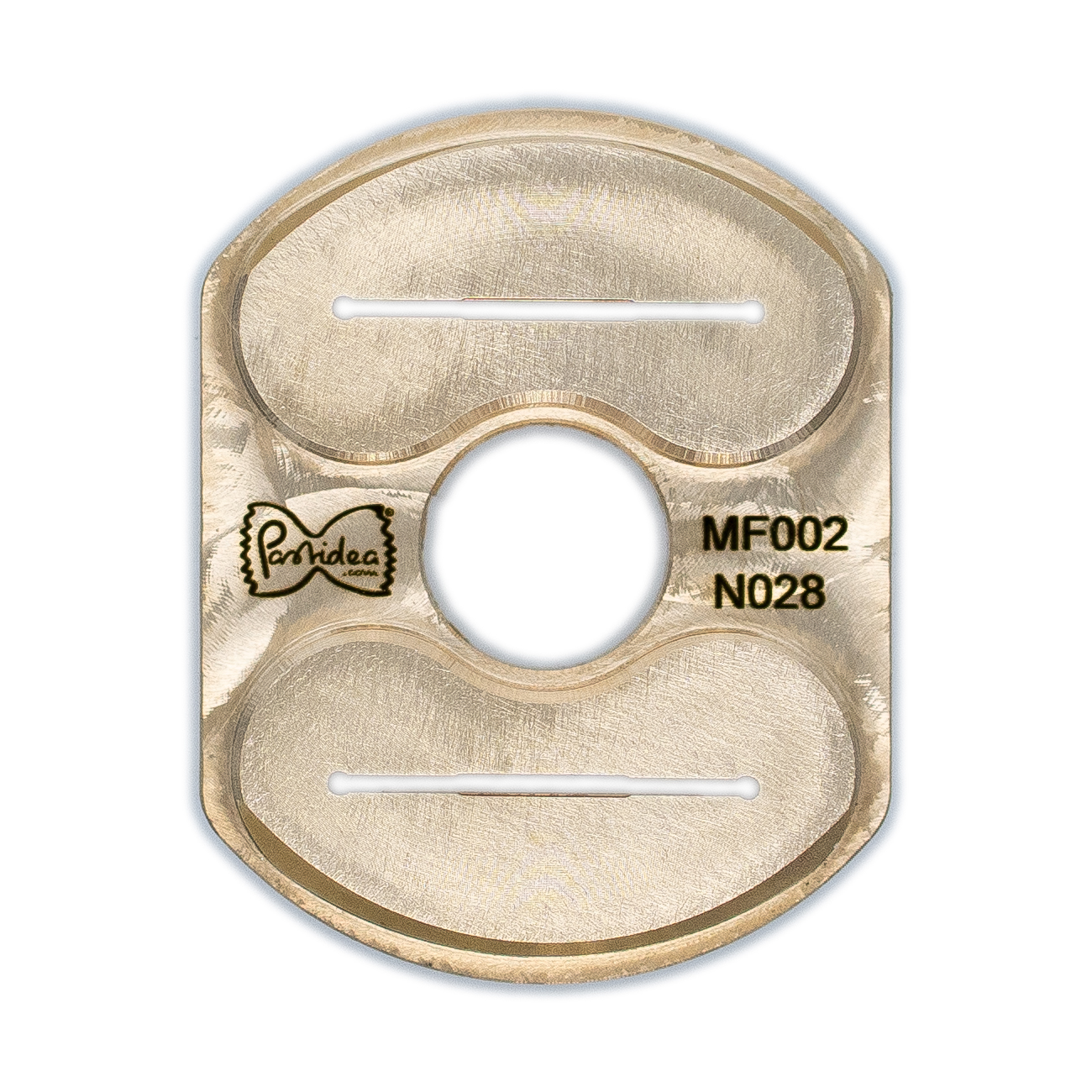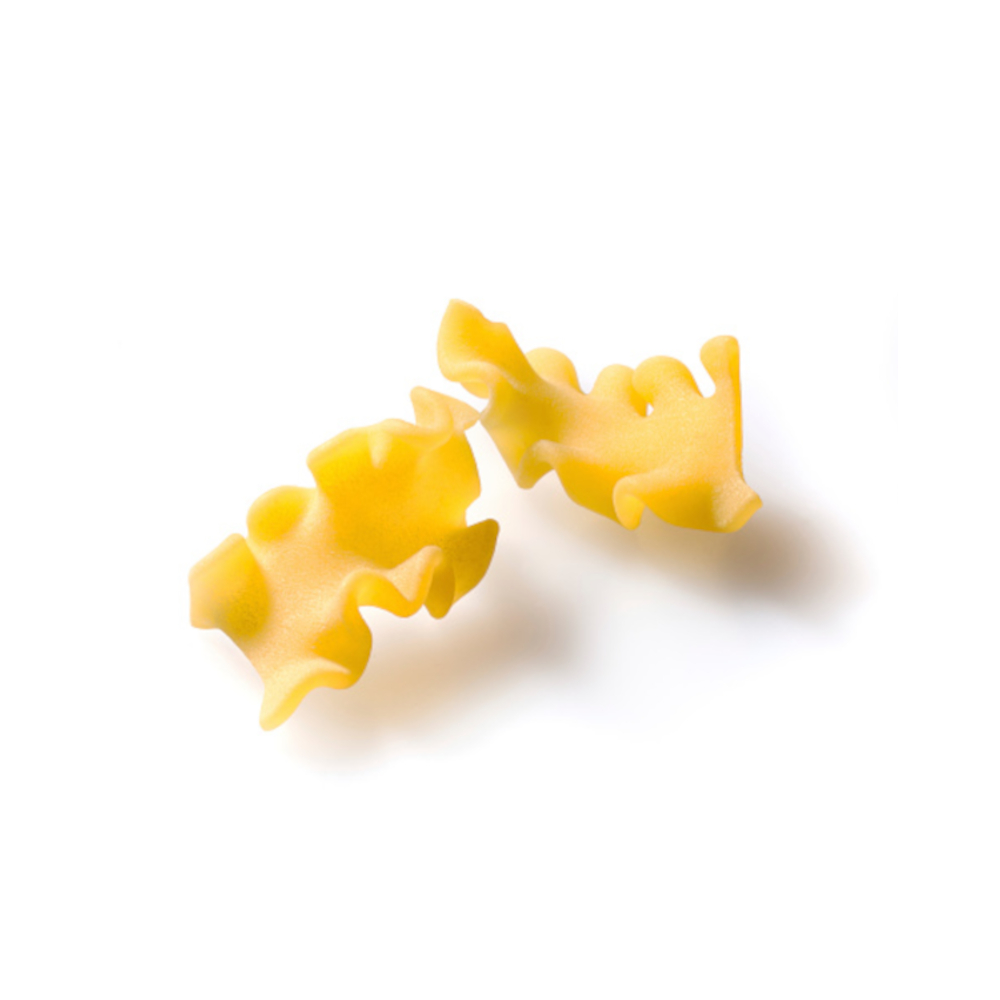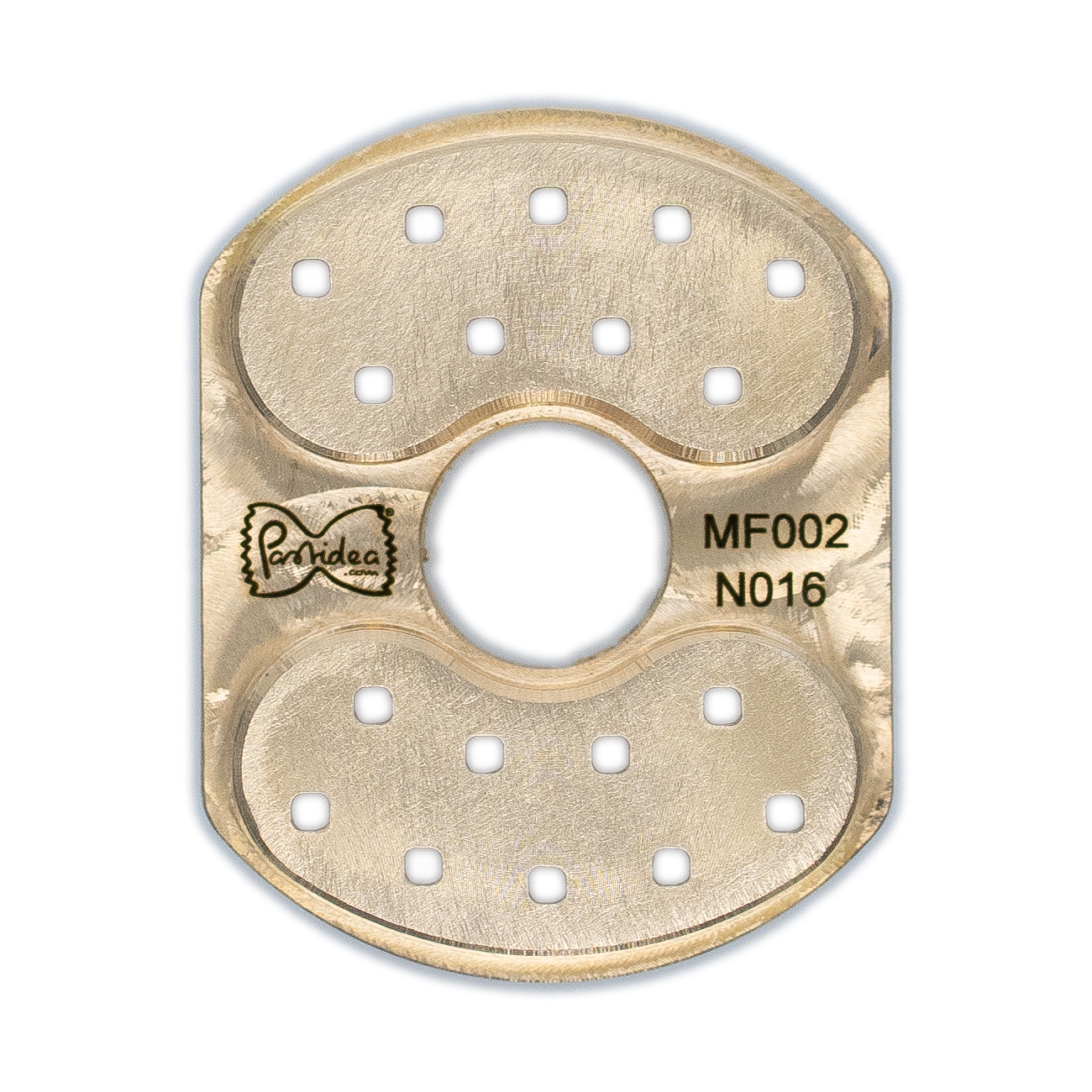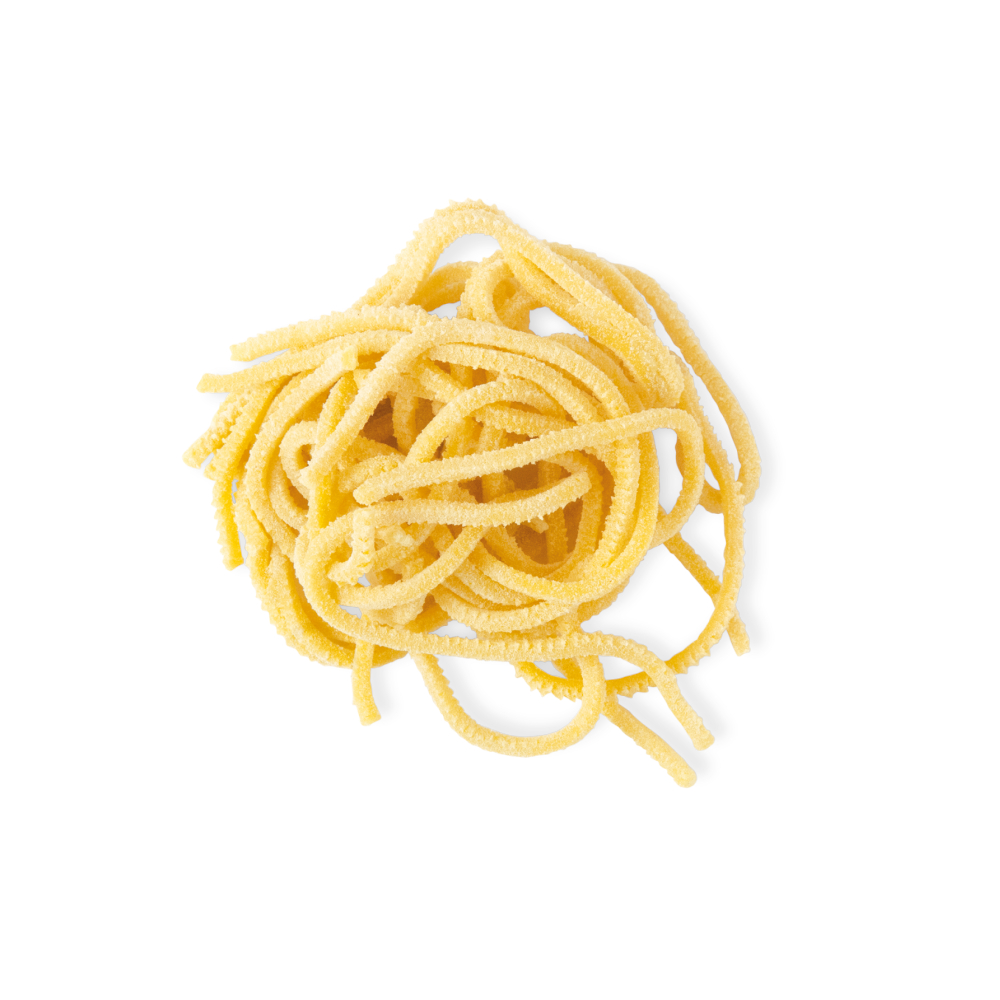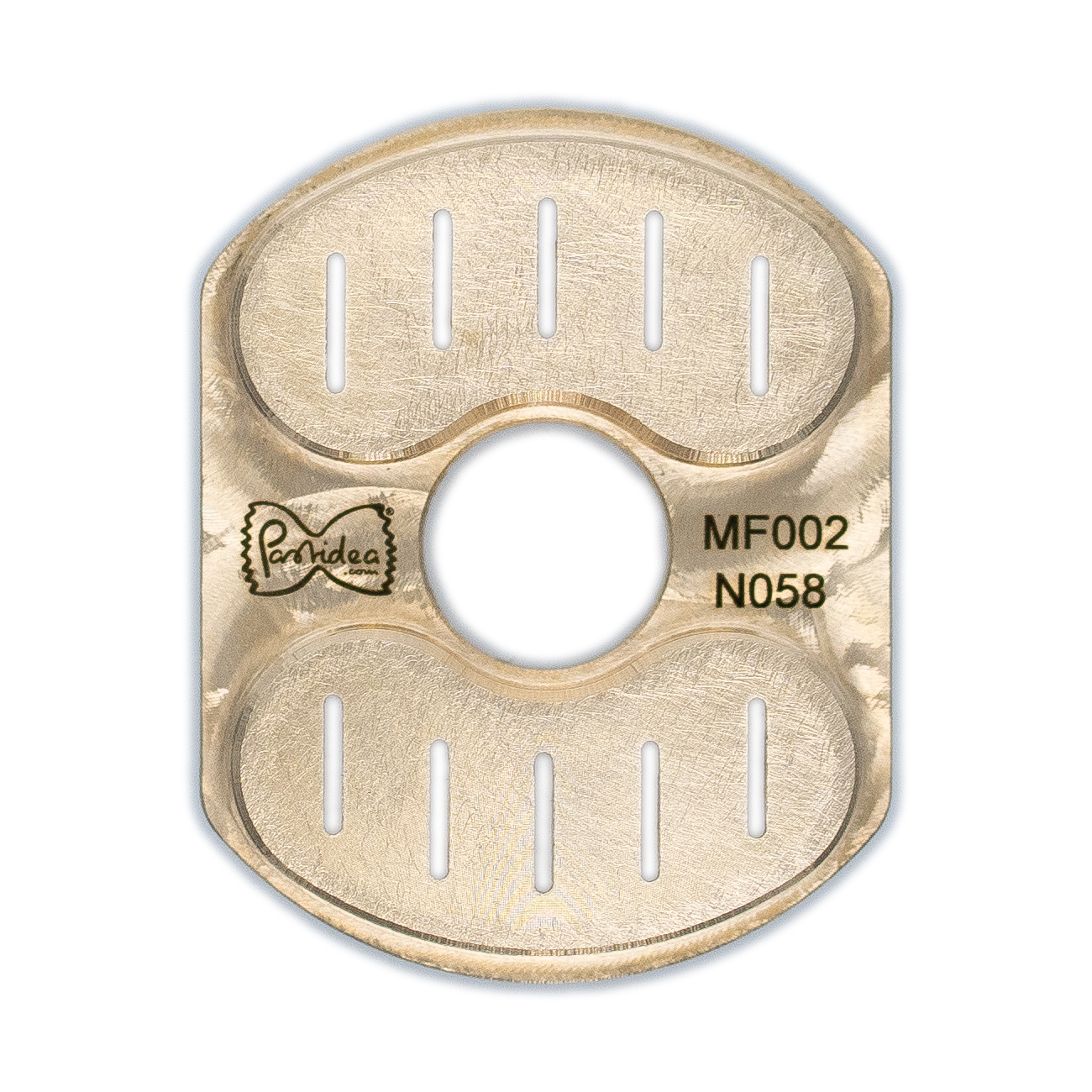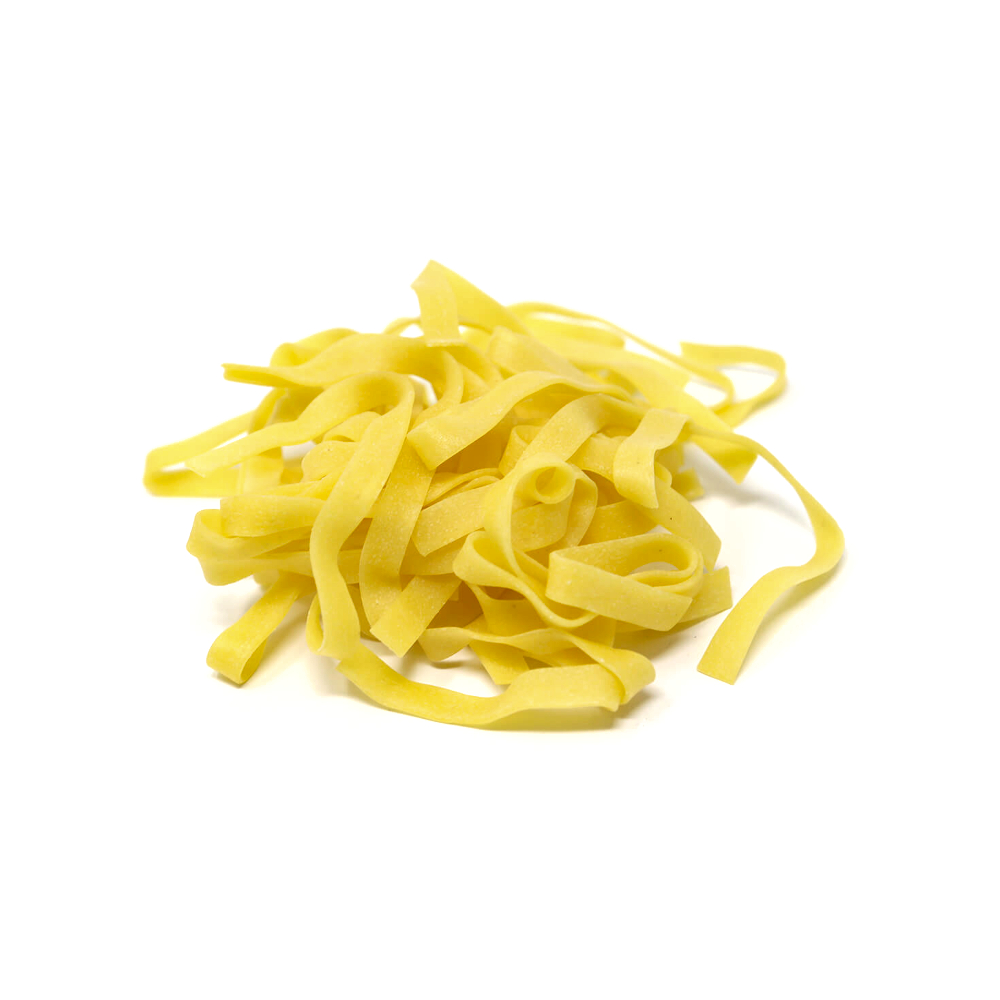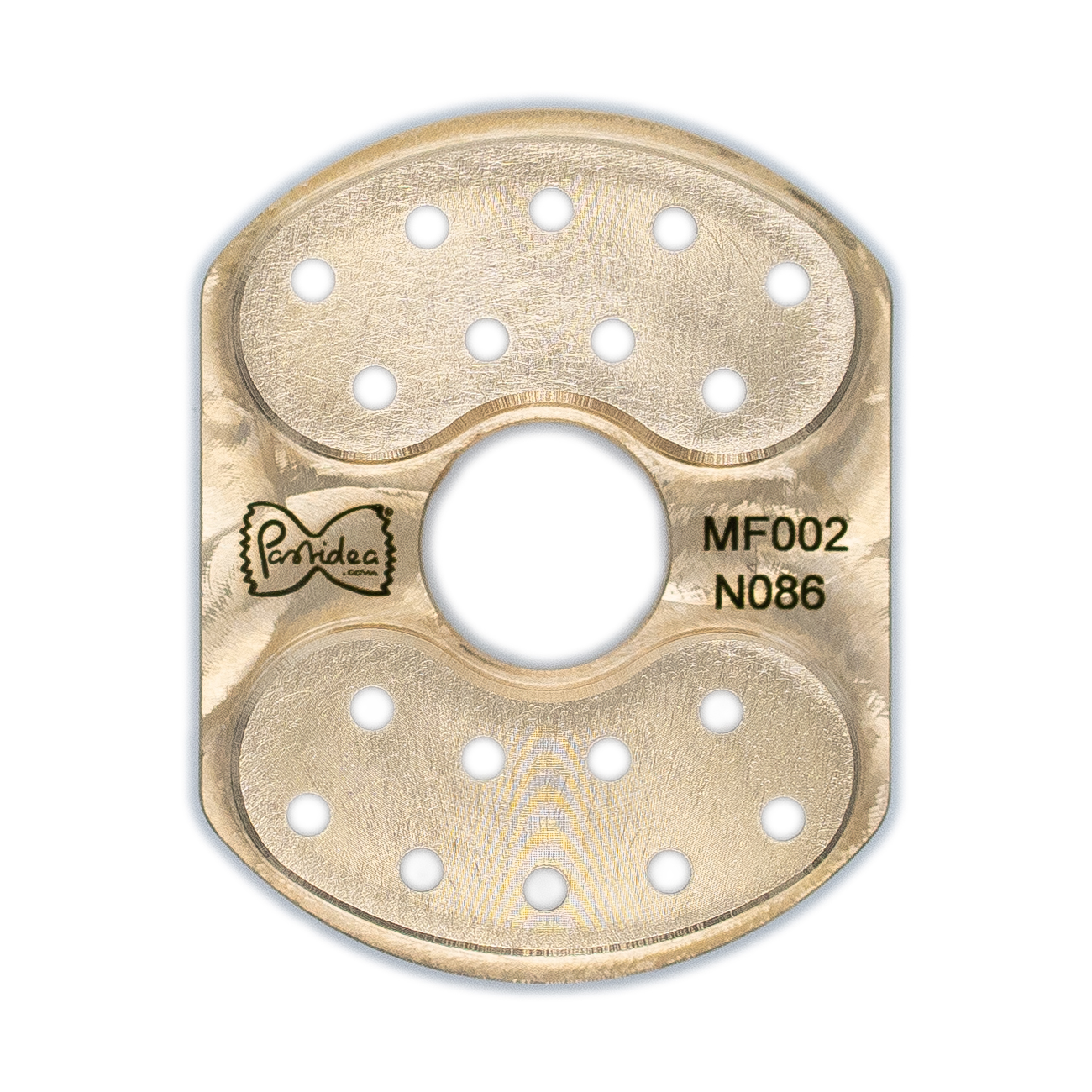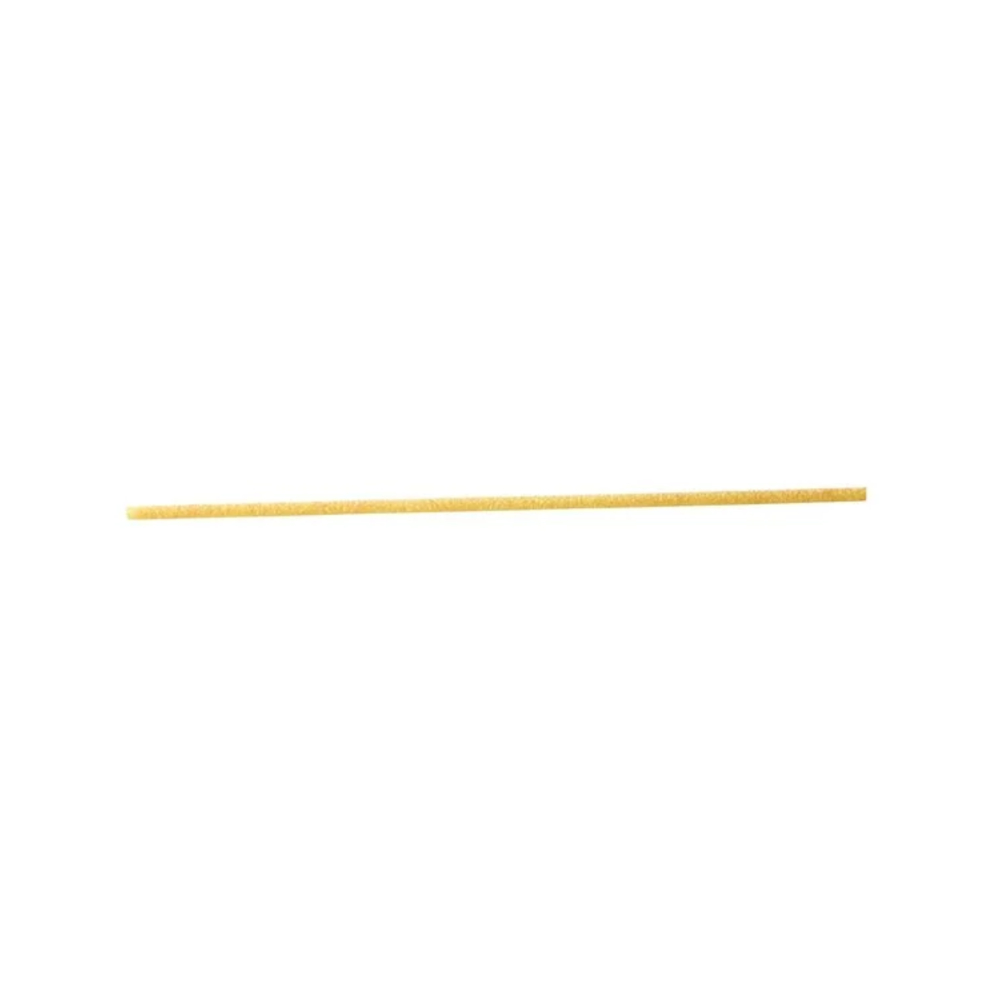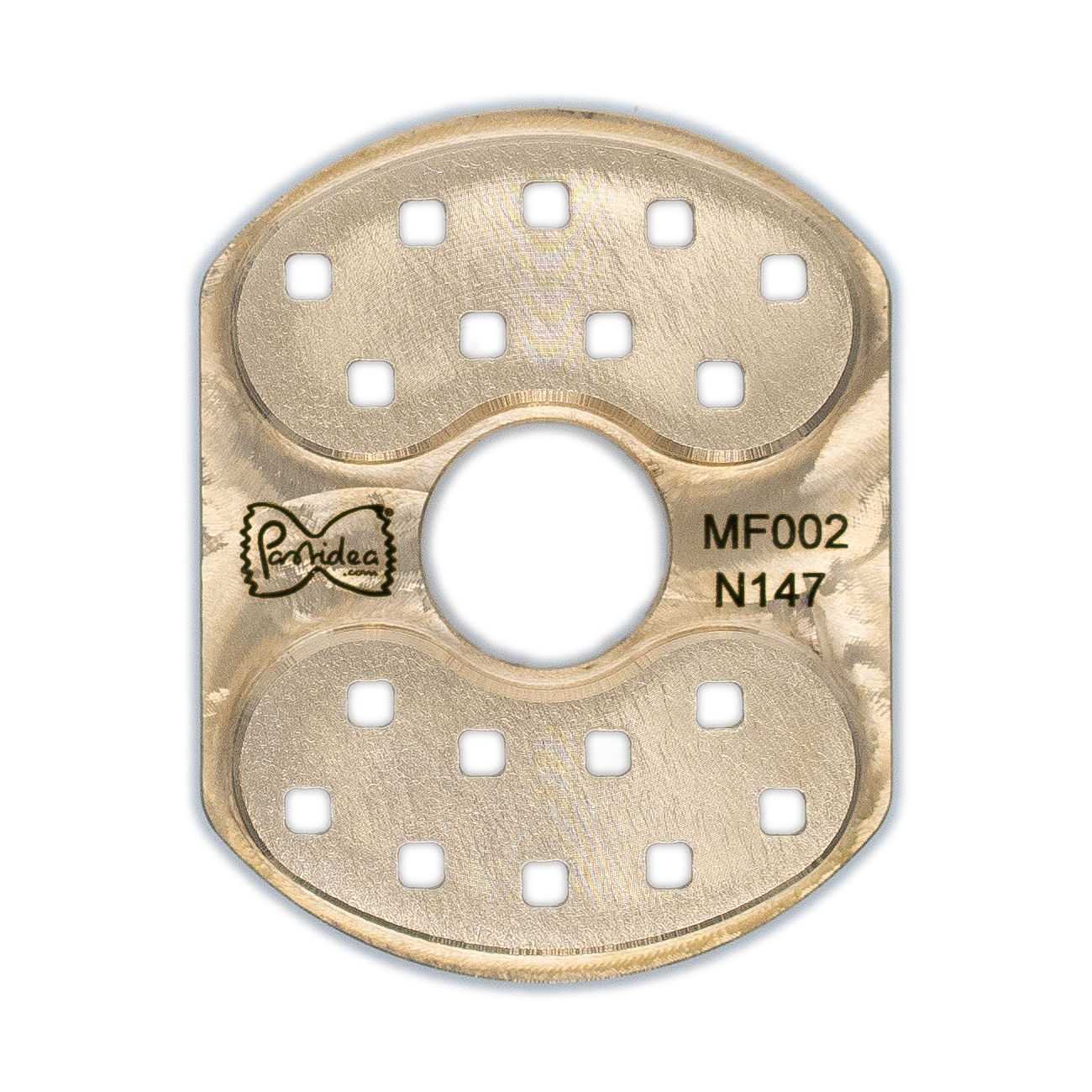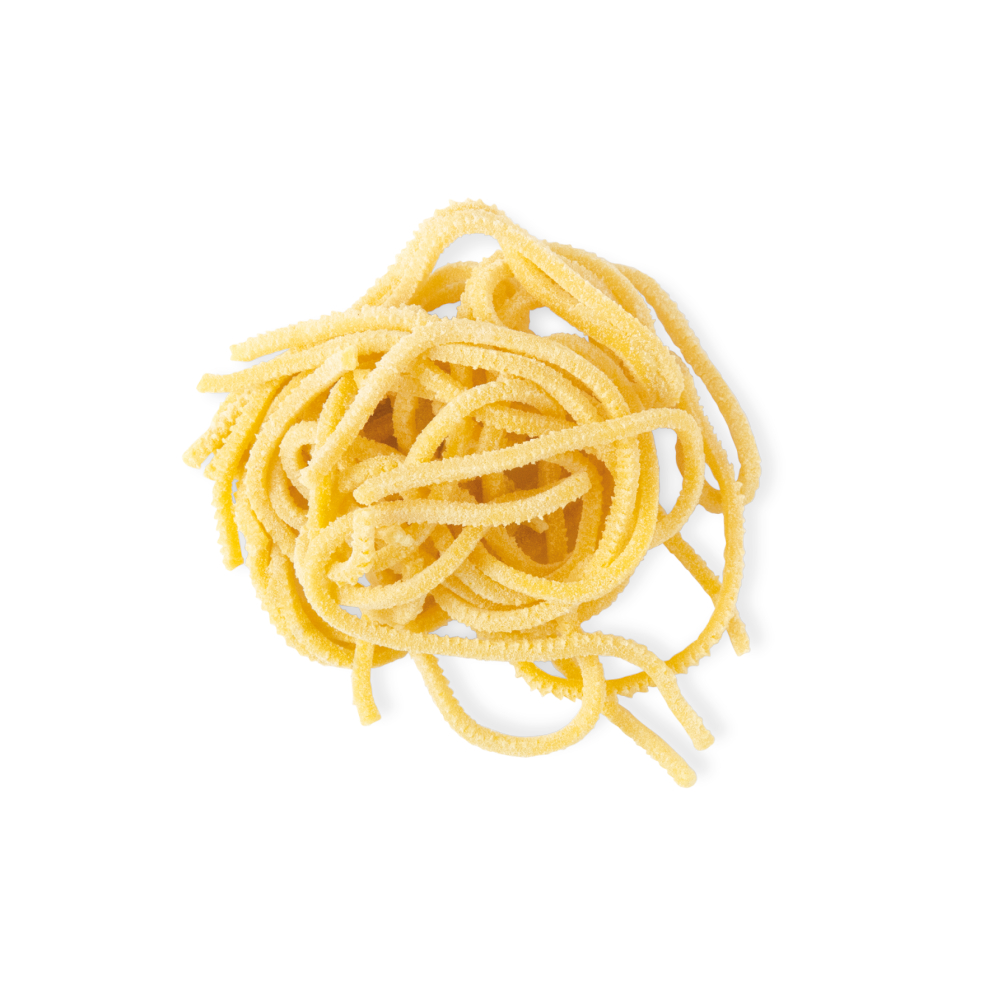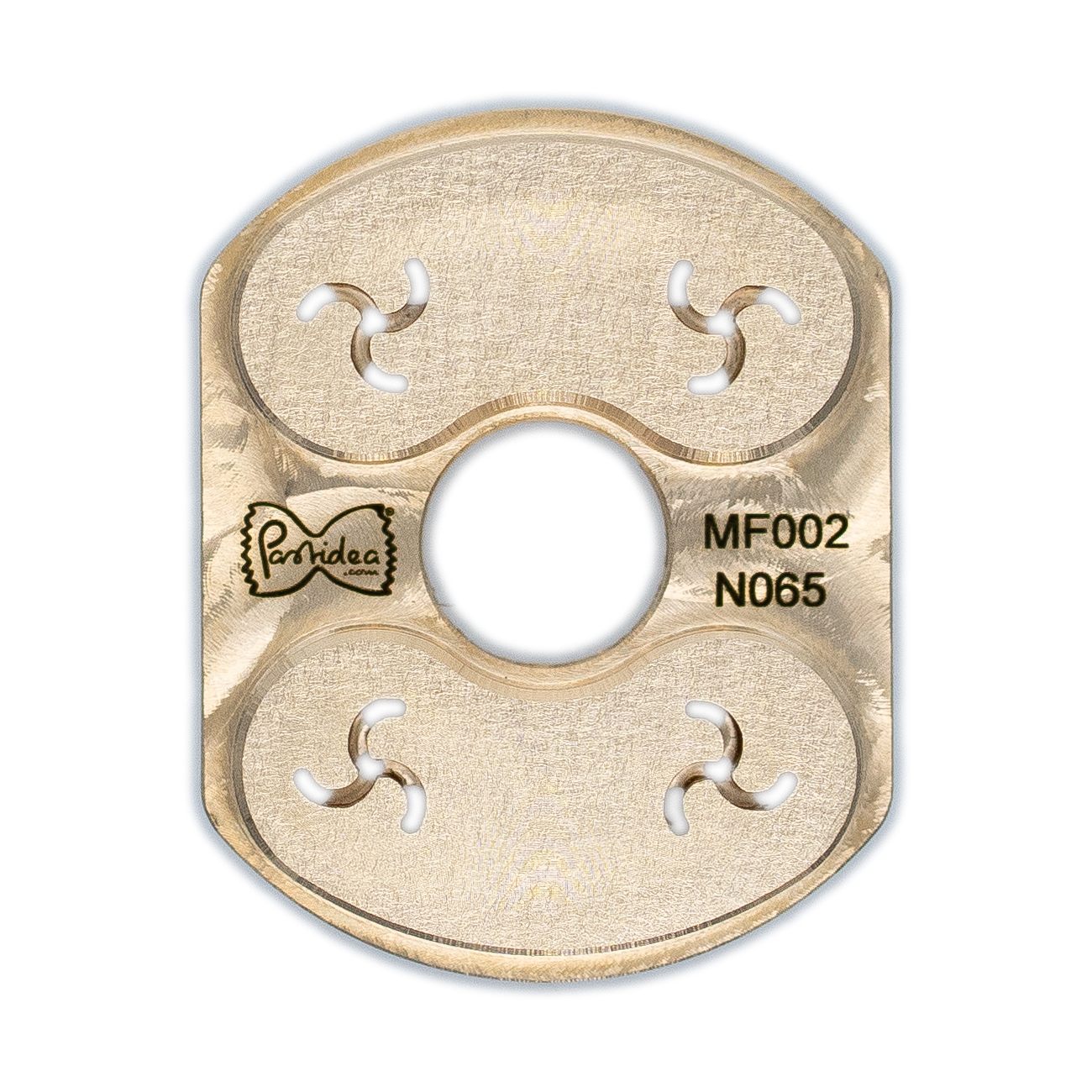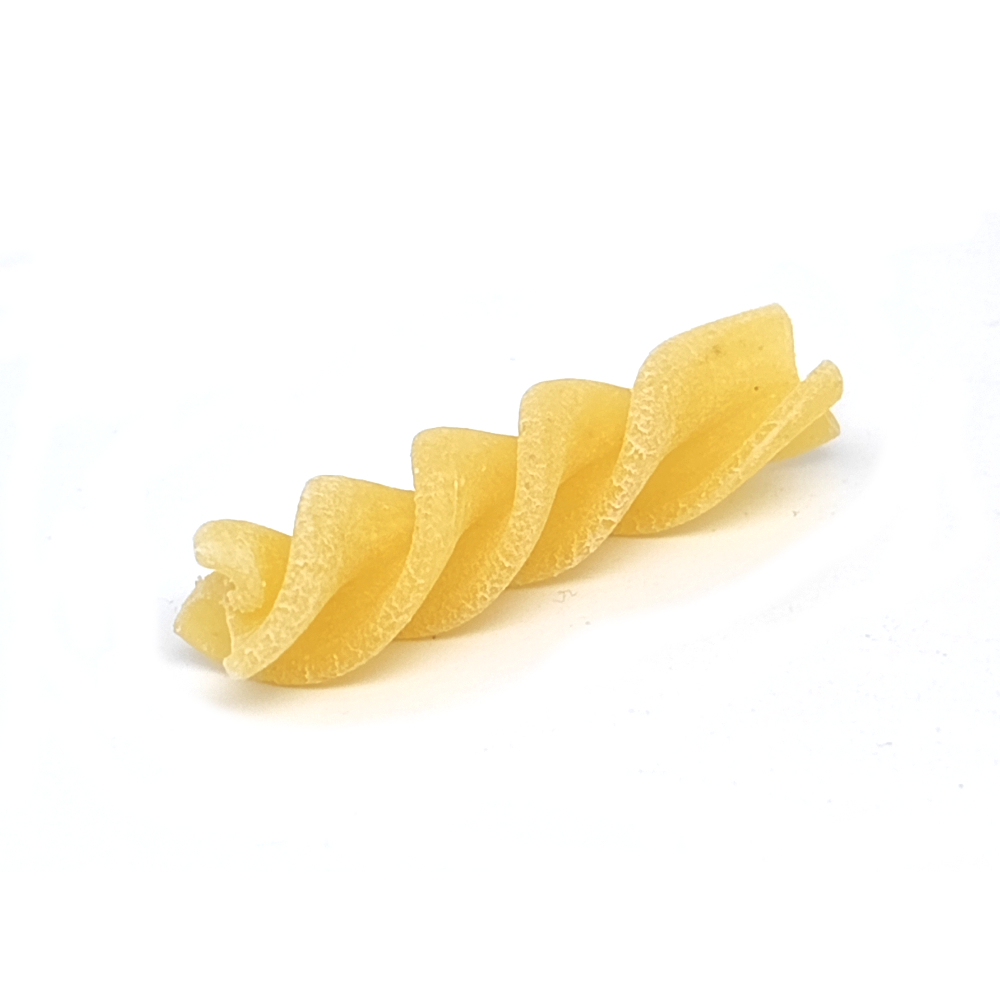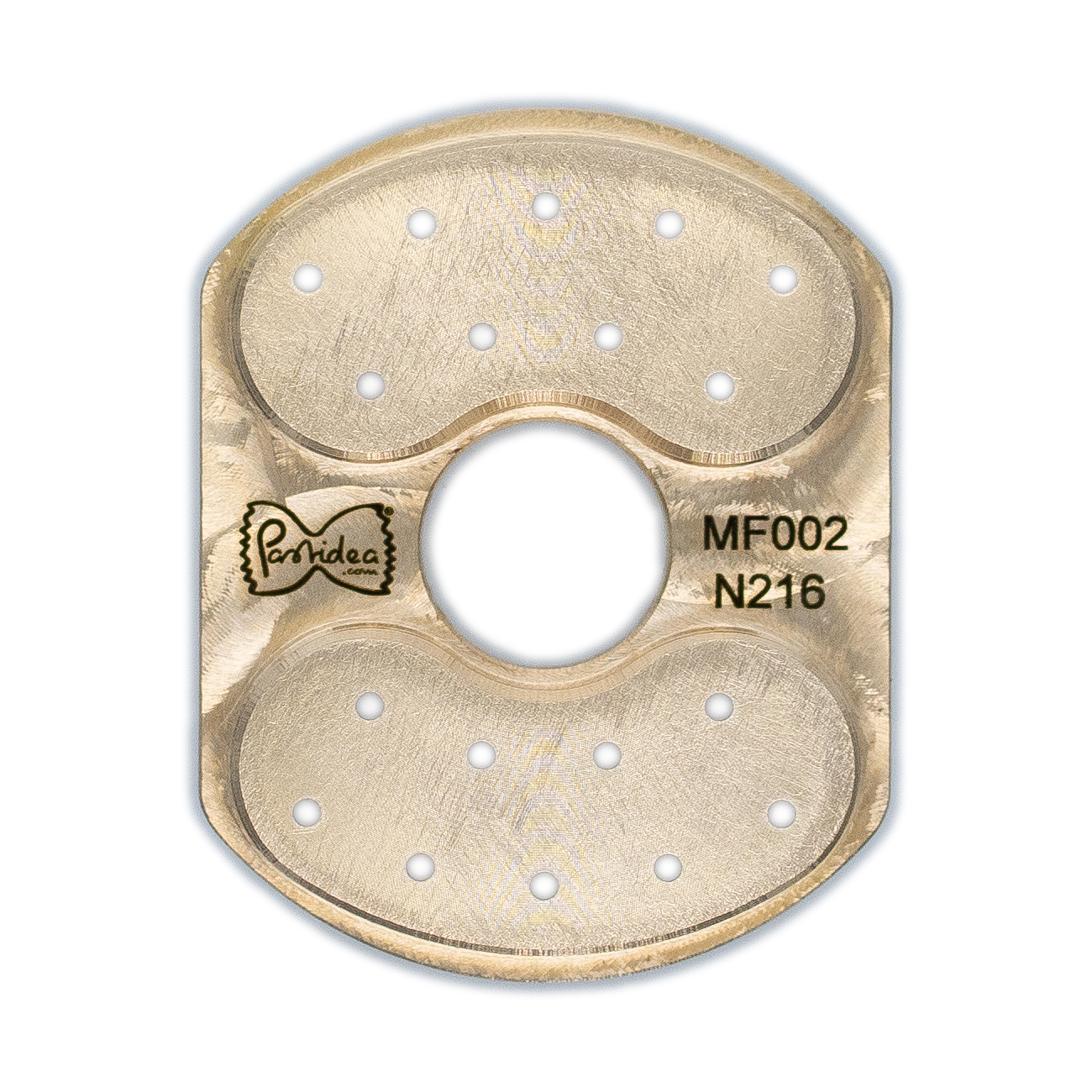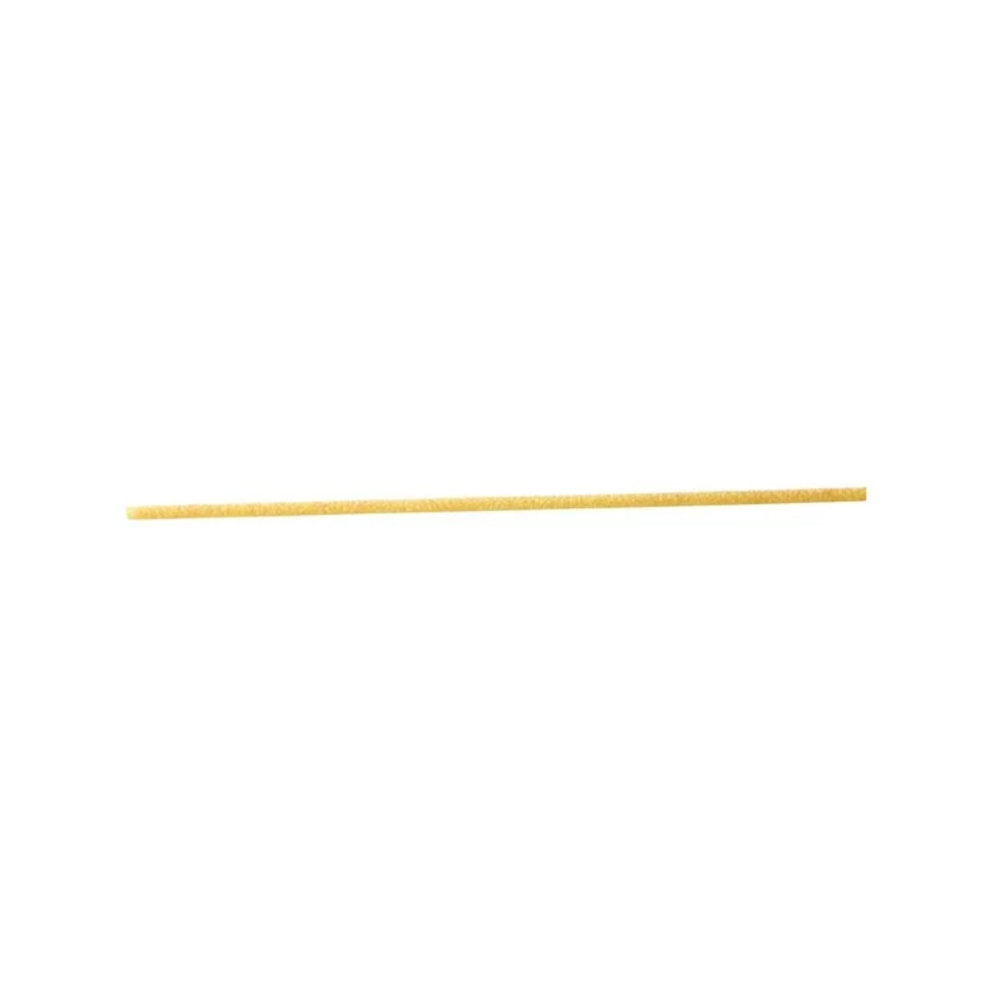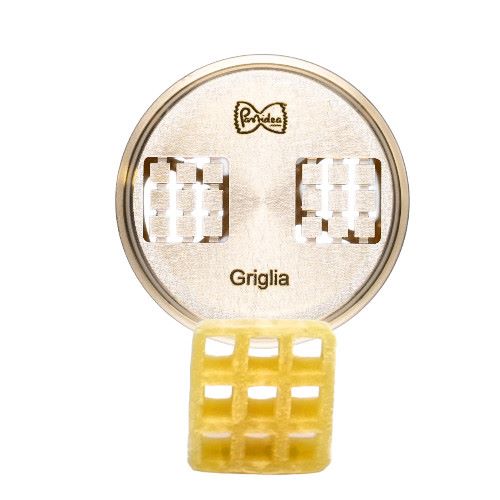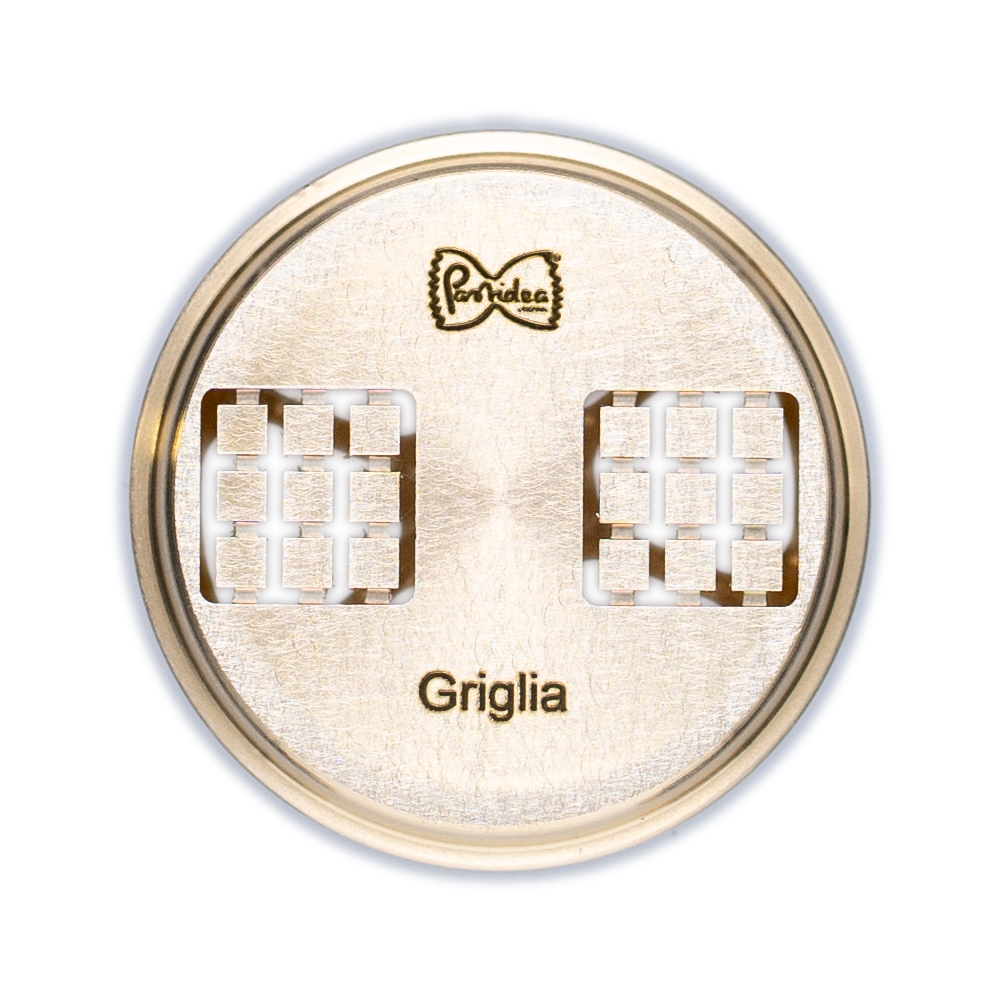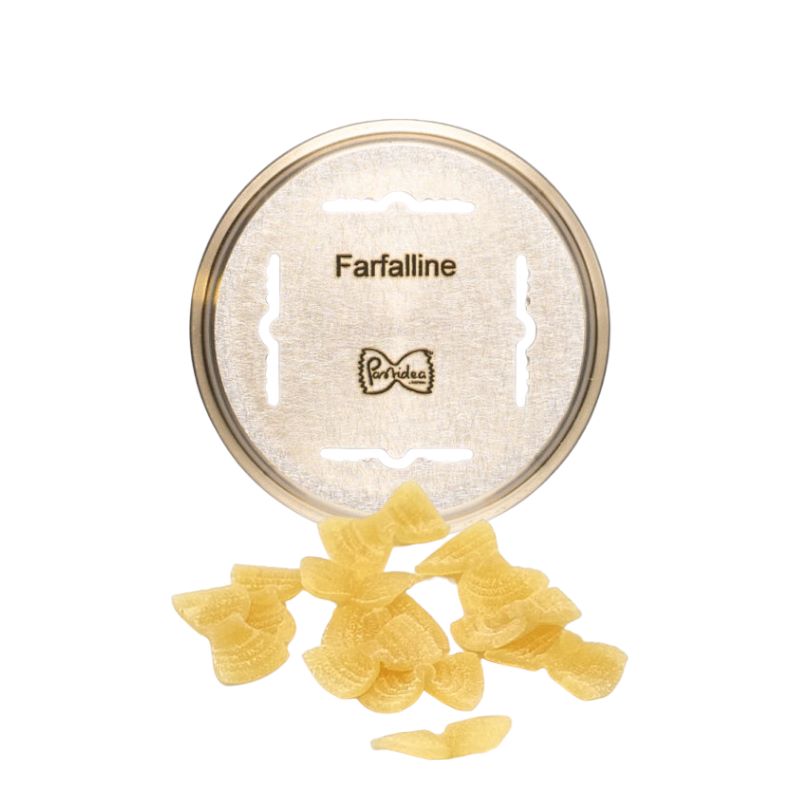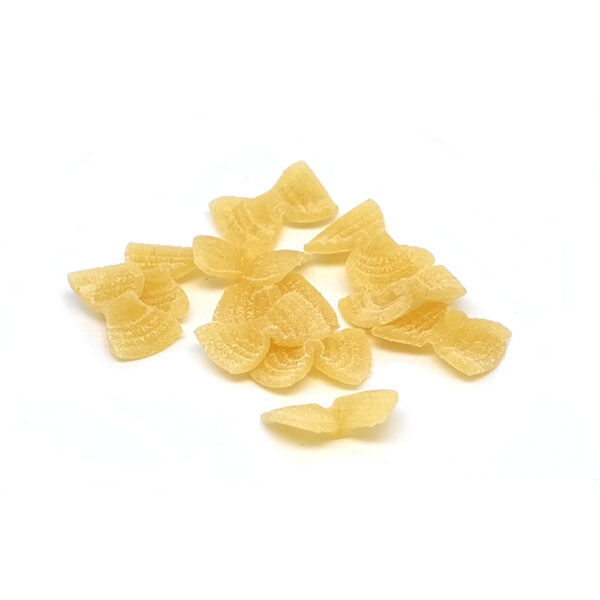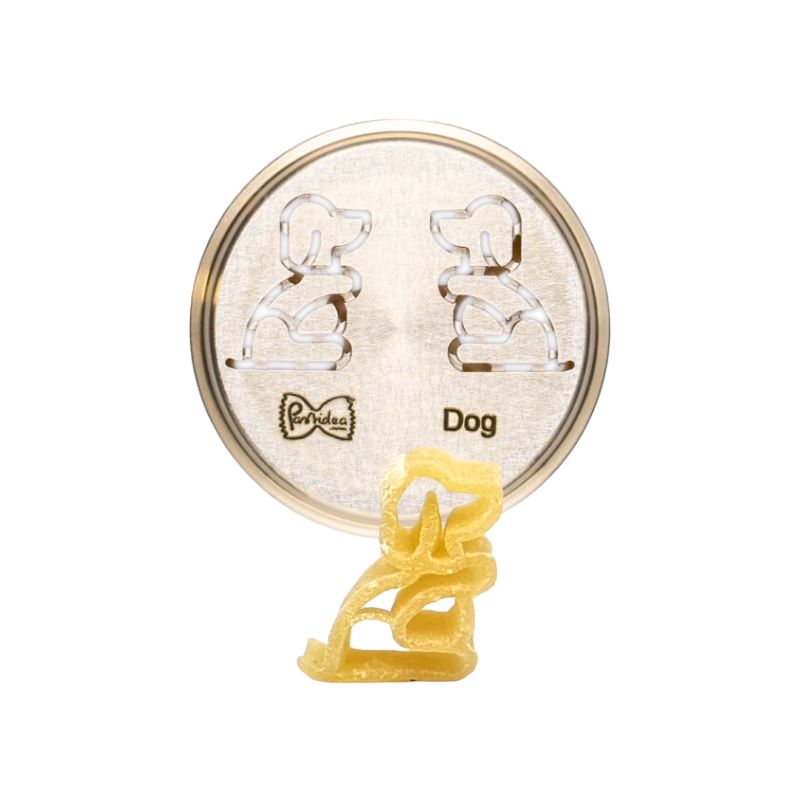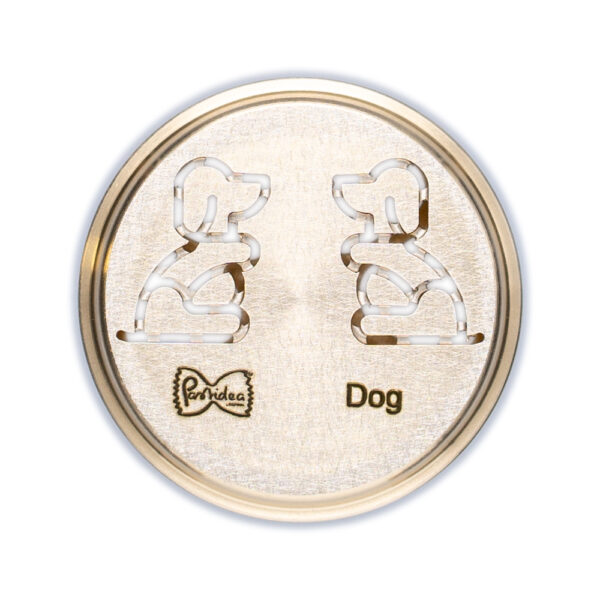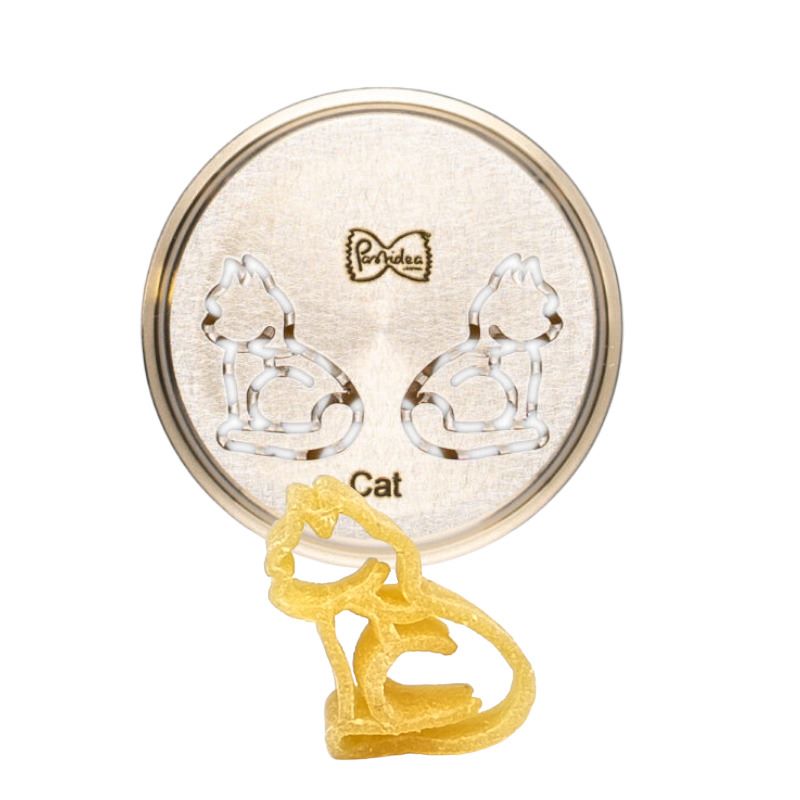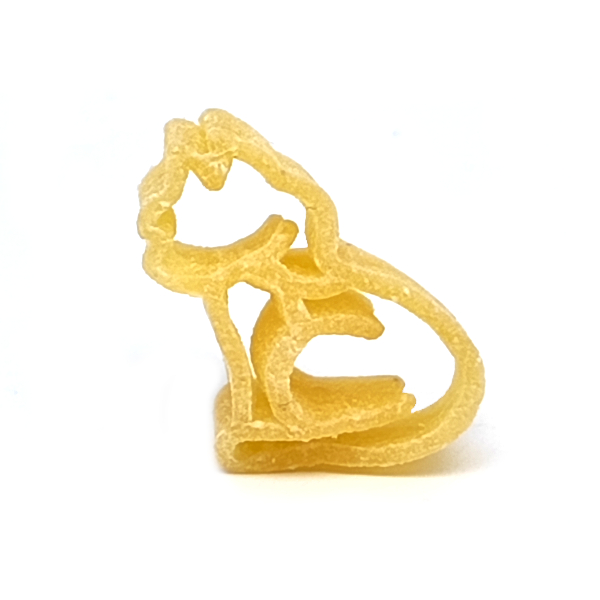19,90 € incl. VAT plus shipping costs
VAT included
excl. Shipping Rate
Pasta insert (type 2) in bronze - spaghetti 2mm This Type 2 pasta die insert is compatible with the Philips Pasta Maker Avance, 7000 Series, Plus and Premium. An insert holder (not included) is required to use it on these machines. With the insert holder it is compatible with the Philips HR2353/xx, HR2354/xx, HR2355/xx, HR2356/xx, HR2357/xx, HR2358/xx, HR2365/xx, HR2375/xx, HR2378/xx, HR2380/xx, HR2381 /xx, HR2382/xx, HR2660/xx, HR2665/xx. “xx” can represent any number between 00 and 99. Material: Standard Bronze (Brass) Size: 2 mm Strength: 2 mm Extrusion (please note the insert holder!): Horizontally and vertically Why bronze: Bronze matrices and these new inserts were the traditional way of making pasta. The pasta made “al bronzo” can only be found rarely and usually only in selected delicatessens. By pressing the pasta dough through the bronze dies, the surface of the pasta is slightly roughened and the pasta becomes more grippy. This allows the pasta to absorb the sauce, flavors and spices better later Recipe: It is recommended to use durum wheat semolina, sufficiently cold liquid such as water and/or egg. The dough should be kneaded for about 8-10 minutes so that the gluten from the durum wheat can fully develop. The result should be a moist, crumbly dough. We recommend the following standard recipe for our matrices: Ingredients: 250 g durum wheat semolina or Semola rimacinata Select ONE of the following ingredients: 100 ml cold water or 110 ml liquid consisting of two eggs, the rest of the water, lightly whisked Instructions: Please only use cold liquids . Avoid flour, replace it with semolina. Use binding agents such as xanthan gum, gluten, etc. only to a limited extent, a maximum of 1 teaspoon per 500 grams of dry ingredients. Otherwise the dough will be too firm and the dies could break. If you knead the dough for longer or let it rest, the gluten will develop on its own. You can recognize a good pasta dough by the fact that it is moist and crumbly. The production of gluten-free pasta is also possible with the inserts. Briefly about the new system: Typically, this new system for making pasta allows you to use the different inlays (for different pasta shapes). ✔ More sustainable and cheaper than the old system ✔ Easier to clean as they can be dismantled ✔ Available inserts in POM or "Bronze" (an alloy) ✔ Patented by Pastidea, not available elsewhere ✔ Smaller and easier to store the disadvantages (temporary) : ✘ Not all shapes are available as inserts ✘ There are not many shapes available at the moment, rather the often requested standard pasta shapes (but more will be coming soon) Please note: Please note that due to the material and production, the bronze inserts may have small dark spots. This is due to the material and does not affect the function in any way. The inserts are not dishwasher safe. They should be dried immediately after cleaning to avoid water stains.
19,90 € incl. VAT plus shipping costs
VAT included
excl. Shipping Rate
Pasta insert (type 2) in bronze - Mafalde 24mm This Type 2 pasta die insert is compatible with the Philips Pasta Maker Avance, 7000 Series, Plus and Premium. An insert holder (not included) is required to use it on these machines. With the insert holder it is compatible with the Philips HR2353/xx, HR2354/xx, HR2355/xx, HR2356/xx, HR2357/xx, HR2358/xx, HR2365/xx, HR2375/xx, HR2378/xx, HR2380/xx, HR2381 /xx, HR2382/xx, HR2660/xx, HR2665/xx. “xx” can represent any number between 00 and 99. Material: Standard Bronze (Brass) Size: 24 mm Strength: 1,2 mm Extrusion (please note the insert holder!): Horizontal Why bronze: Bronze matrices and these new inserts were the traditional way of making pasta. The pasta made “al bronzo” can only be found rarely and usually only in selected delicatessens. By pressing the pasta dough through the bronze dies, the surface of the pasta is slightly roughened and the pasta becomes more grippy. This allows the pasta to absorb the sauce, flavors and spices better later Recipe: It is recommended to use durum wheat semolina, sufficiently cold liquid such as water and/or egg. The dough should be kneaded for about 8-10 minutes so that the gluten from the durum wheat can fully develop. The result should be a moist, crumbly dough. We recommend the following standard recipe for our matrices: Ingredients: 250 g durum wheat semolina or Semola rimacinata Select ONE of the following ingredients: 100 ml cold water or 110 ml liquid consisting of two eggs, the rest of the water, lightly whisked Instructions: Please only use cold liquids . Avoid flour, replace it with semolina. Use binding agents such as xanthan gum, gluten, etc. only to a limited extent, a maximum of 1 teaspoon per 500 grams of dry ingredients. Otherwise the dough will be too firm and the dies could break. If you knead the dough for longer or let it rest, the gluten will develop on its own. You can recognize a good pasta dough by the fact that it is moist and crumbly. The production of gluten-free pasta is also possible with the inserts. Briefly about the new system: Typically, this new system for making pasta allows you to use the different inlays (for different pasta shapes). ✔ More sustainable and cheaper than the old system ✔ Easier to clean as they can be dismantled ✔ Available inserts in POM or "Bronze" (an alloy) ✔ Patented by Pastidea, not available elsewhere ✔ Smaller and easier to store the disadvantages (temporary) : ✘ Not all shapes are available as inserts ✘ There are not many shapes available at the moment, rather the often requested standard pasta shapes (but more will be coming soon) Please note: Please note that due to the material and production, the bronze inserts may have small dark spots. This is due to the material and does not affect the function in any way. The inserts are not dishwasher safe. They should be dried immediately after cleaning to avoid water stains.
19,90 € incl. VAT plus shipping costs
VAT included
excl. Shipping Rate
Pasta insert (type 2) in bronze - Spaghetti Quadri Chitarra 2x2mm This Type 2 pasta die insert is compatible with the Philips Pasta Maker Avance, 7000 Series, Plus and Premium. An insert holder (not included) is required to use it on these machines. With the insert holder it is compatible with the Philips HR2353/xx, HR2354/xx, HR2355/xx, HR2356/xx, HR2357/xx, HR2358/xx, HR2365/xx, HR2375/xx, HR2378/xx, HR2380/xx, HR2381 /xx, HR2382/xx, HR2660/xx, HR2665/xx. “xx” can represent any number between 00 and 99. Material: Standard Bronze (Brass) Size: 2 mm Strength: 2 mm Extrusion (please note the insert holder!): Horizontally and vertically Why bronze: Bronze matrices and these new inserts were the traditional way of making pasta. The pasta made “al bronzo” can only be found rarely and usually only in selected delicatessens. By pressing the pasta dough through the bronze dies, the surface of the pasta is slightly roughened and the pasta becomes more grippy. This allows the pasta to absorb the sauce, flavors and spices better later Recipe: It is recommended to use durum wheat semolina, sufficiently cold liquid such as water and/or egg. The dough should be kneaded for about 8-10 minutes so that the gluten from the durum wheat can fully develop. The result should be a moist, crumbly dough. We recommend the following standard recipe for our matrices: Ingredients: 250 g durum wheat semolina or Semola rimacinata Select ONE of the following ingredients: 100 ml cold water or 110 ml liquid consisting of two eggs, the rest of the water, lightly whisked Instructions: Please only use cold liquids . Avoid flour, replace it with semolina. Use binding agents such as xanthan gum, gluten, etc. only to a limited extent, a maximum of 1 teaspoon per 500 grams of dry ingredients. Otherwise the dough will be too firm and the dies could break. If you knead the dough for longer or let it rest, the gluten will develop on its own. You can recognize a good pasta dough by the fact that it is moist and crumbly. The production of gluten-free pasta is also possible with the inserts. Briefly about the new system: Typically, this new system for making pasta allows you to use the different inlays (for different pasta shapes). ✔ More sustainable and cheaper than the old system ✔ Easier to clean as they can be dismantled ✔ Available inserts in POM or "Bronze" (an alloy) ✔ Patented by Pastidea, not available elsewhere ✔ Smaller and easier to store the disadvantages (temporary) : ✘ Not all shapes are available as inserts ✘ There are not many shapes available at the moment, rather the often requested standard pasta shapes (but more will be coming soon) Please note: Please note that due to the material and production, the bronze inserts may have small dark spots. This is due to the material and does not affect the function in any way. The inserts are not dishwasher safe. They should be dried immediately after cleaning to avoid water stains.
19,90 € incl. VAT plus shipping costs
VAT included
excl. Shipping Rate
Pasta insert (type 2) in bronze - tagliatelle 8mm This Type 2 pasta die insert is compatible with the Philips Pasta Maker Avance, 7000 Series, Plus and Premium. An insert holder (not included) is required to use it on these machines. With the insert holder it is compatible with the Philips HR2353/xx, HR2354/xx, HR2355/xx, HR2356/xx, HR2357/xx, HR2358/xx, HR2365/xx, HR2375/xx, HR2378/xx, HR2380/xx, HR2381 /xx, HR2382/xx, HR2660/xx, HR2665/xx. “xx” can represent any number between 00 and 99. Material: Standard Bronze (Brass) Size: 8 mm Strength: 1 mm Extrusion (please note the insert holder!): Horizontally and vertically Why bronze: Bronze matrices and these new inserts were the traditional way of making pasta. The pasta made “al bronzo” can only be found rarely and usually only in selected delicatessens. By pressing the pasta dough through the bronze dies, the surface of the pasta is slightly roughened and the pasta becomes more grippy. This allows the pasta to absorb the sauce, flavors and spices better later Recipe: It is recommended to use durum wheat semolina, sufficiently cold liquid such as water and/or egg. The dough should be kneaded for about 8-10 minutes so that the gluten from the durum wheat can fully develop. The result should be a moist, crumbly dough. We recommend the following standard recipe for our matrices: Ingredients: 250 g durum wheat semolina or Semola rimacinata Select ONE of the following ingredients: 100 ml cold water or 110 ml liquid consisting of two eggs, the rest of the water, lightly whisked Instructions: Please only use cold liquids . Avoid flour, replace it with semolina. Use binding agents such as xanthan gum, gluten, etc. only to a limited extent, a maximum of 1 teaspoon per 500 grams of dry ingredients. Otherwise the dough will be too firm and the dies could break. If you knead the dough for longer or let it rest, the gluten will develop on its own. You can recognize a good pasta dough by the fact that it is moist and crumbly. The production of gluten-free pasta is also possible with the inserts. Briefly about the new system: Typically, this new system for making pasta allows you to use the different inlays (for different pasta shapes). ✔ More sustainable and cheaper than the old system ✔ Easier to clean as they can be dismantled ✔ Available inserts in POM or "Bronze" (an alloy) ✔ Patented by Pastidea, not available elsewhere ✔ Smaller and easier to store the disadvantages (temporary) : ✘ Not all shapes are available as inserts ✘ There are not many shapes available at the moment, rather the often requested standard pasta shapes (but more will be coming soon) Please note: Please note that due to the material and production, the bronze inserts may have small dark spots. This is due to the material and does not affect the function in any way. The inserts are not dishwasher safe. They should be dried immediately after cleaning to avoid water stains.
Pasta insert in bronze – Spaghetti 2.5mm – for Philips Avance / 7000 Series (insert holder required)
19,90 € incl. VAT plus shipping costs
VAT included
excl. Shipping Rate
Pasta insert (type 2) in bronze - spaghetti 2.5mm This Type 2 pasta die insert is compatible with the Philips Pasta Maker Avance, 7000 Series, Plus and Premium. An insert holder (not included) is required to use it on these machines. With the insert holder it is compatible with the Philips HR2353/xx, HR2354/xx, HR2355/xx, HR2356/xx, HR2357/xx, HR2358/xx, HR2365/xx, HR2375/xx, HR2378/xx, HR2380/xx, HR2381 /xx, HR2382/xx, HR2660/xx, HR2665/xx. “xx” can represent any number between 00 and 99. Material: Standard Bronze (Brass) Size: 2,5 mm Strength: 2,5 mm Extrusion (please note the insert holder!): Horizontally and vertically Why bronze: Bronze matrices and these new inserts were the traditional way of making pasta. The pasta made “al bronzo” can only be found rarely and usually only in selected delicatessens. By pressing the pasta dough through the bronze dies, the surface of the pasta is slightly roughened and the pasta becomes more grippy. This allows the pasta to absorb the sauce, flavors and spices better later Recipe: It is recommended to use durum wheat semolina, sufficiently cold liquid such as water and/or egg. The dough should be kneaded for about 8-10 minutes so that the gluten from the durum wheat can fully develop. The result should be a moist, crumbly dough. We recommend the following standard recipe for our matrices: Ingredients: 250 g durum wheat semolina or Semola rimacinata Select ONE of the following ingredients: 100 ml cold water or 110 ml liquid consisting of two eggs, the rest of the water, lightly whisked Instructions: Please only use cold liquids . Avoid flour, replace it with semolina. Use binding agents such as xanthan gum, gluten, etc. only to a limited extent, a maximum of 1 teaspoon per 500 grams of dry ingredients. Otherwise the dough will be too firm and the dies could break. If you knead the dough for longer or let it rest, the gluten will develop on its own. You can recognize a good pasta dough by the fact that it is moist and crumbly. The production of gluten-free pasta is also possible with the inserts. Briefly about the new system: Typically, this new system for making pasta allows you to use the different inlays (for different pasta shapes). ✔ More sustainable and cheaper than the old system ✔ Easier to clean as they can be dismantled ✔ Available inserts in POM or "Bronze" (an alloy) ✔ Patented by Pastidea, not available elsewhere ✔ Smaller and easier to store the disadvantages (temporary) : ✘ Not all shapes are available as inserts ✘ There are not many shapes available at the moment, rather the often requested standard pasta shapes (but more will be coming soon) Please note: Please note that due to the material and production, the bronze inserts may have small dark spots. This is due to the material and does not affect the function in any way. The inserts are not dishwasher safe. They should be dried immediately after cleaning to avoid water stains.
19,90 € incl. VAT plus shipping costs
VAT included
excl. Shipping Rate
Pasta insert (type 2) in bronze - Spaghetti Quadri Chitarra 2,5x2,5mm This Type 2 pasta die insert is compatible with the Philips Pasta Maker Avance, 7000 Series, Plus and Premium. An insert holder (not included) is required to use it on these machines. With the insert holder it is compatible with the Philips HR2353/xx, HR2354/xx, HR2355/xx, HR2356/xx, HR2357/xx, HR2358/xx, HR2365/xx, HR2375/xx, HR2378/xx, HR2380/xx, HR2381 /xx, HR2382/xx, HR2660/xx, HR2665/xx. “xx” can represent any number between 00 and 99. Material: Standard Bronze (Brass) Size: 2,5 mm Strength: 2,5 mm Extrusion (please note the insert holder!): Horizontally and vertically Why bronze: Bronze matrices and these new inserts were the traditional way of making pasta. The pasta made “al bronzo” can only be found rarely and usually only in selected delicatessens. By pressing the pasta dough through the bronze dies, the surface of the pasta is slightly roughened and the pasta becomes more grippy. This allows the pasta to absorb the sauce, flavors and spices better later Recipe: It is recommended to use durum wheat semolina, sufficiently cold liquid such as water and/or egg. The dough should be kneaded for about 8-10 minutes so that the gluten from the durum wheat can fully develop. The result should be a moist, crumbly dough. We recommend the following standard recipe for our matrices: Ingredients: 250 g durum wheat semolina or Semola rimacinata Select ONE of the following ingredients: 100 ml cold water or 110 ml liquid consisting of two eggs, the rest of the water, lightly whisked Instructions: Please only use cold liquids . Avoid flour, replace it with semolina. Use binding agents such as xanthan gum, gluten, etc. only to a limited extent, a maximum of 1 teaspoon per 500 grams of dry ingredients. Otherwise the dough will be too firm and the dies could break. If you knead the dough for longer or let it rest, the gluten will develop on its own. You can recognize a good pasta dough by the fact that it is moist and crumbly. The production of gluten-free pasta is also possible with the inserts. Briefly about the new system: Typically, this new system for making pasta allows you to use the different inlays (for different pasta shapes). ✔ More sustainable and cheaper than the old system ✔ Easier to clean as they can be dismantled ✔ Available inserts in POM or "Bronze" (an alloy) ✔ Patented by Pastidea, not available elsewhere ✔ Smaller and easier to store the disadvantages (temporary) : ✘ Not all shapes are available as inserts ✘ There are not many shapes available at the moment, rather the often requested standard pasta shapes (but more will be coming soon) Please note: Please note that due to the material and production, the bronze inserts may have small dark spots. This is due to the material and does not affect the function in any way. The inserts are not dishwasher safe. They should be dried immediately after cleaning to avoid water stains.
19,90 € incl. VAT plus shipping costs
VAT included
excl. Shipping Rate
Pasta insert (type 2) in bronze - Fusilli A3 8,5mm This Type 2 pasta die insert is compatible with the Philips Pasta Maker Avance, 7000 Series, Plus and Premium. An insert holder (not included) is required to use it on these machines. With the insert holder it is compatible with the Philips HR2353/xx, HR2354/xx, HR2355/xx, HR2356/xx, HR2357/xx, HR2358/xx, HR2365/xx, HR2375/xx, HR2378/xx, HR2380/xx, HR2381 /xx, HR2382/xx, HR2660/xx, HR2665/xx. “xx” can represent any number between 00 and 99. Material: Standard Bronze (Brass) Size: 8,5 mm Strength: 1,1 mm Extrusion (please note the insert holder!): Horizontally and vertically Why bronze: Bronze matrices and these new inserts were the traditional way of making pasta. The pasta made “al bronzo” can only be found rarely and usually only in selected delicatessens. By pressing the pasta dough through the bronze dies, the surface of the pasta is slightly roughened and the pasta becomes more grippy. This allows the pasta to absorb the sauce, flavors and spices better later Recipe: It is recommended to use durum wheat semolina, sufficiently cold liquid such as water and/or egg. The dough should be kneaded for about 8-10 minutes so that the gluten from the durum wheat can fully develop. The result should be a moist, crumbly dough. We recommend the following standard recipe for our matrices: Ingredients: 250 g durum wheat semolina or Semola rimacinata Select ONE of the following ingredients: 100 ml cold water or 110 ml liquid consisting of two eggs, the rest of the water, lightly whisked Instructions: Please only use cold liquids . Avoid flour, replace it with semolina. Use binding agents such as xanthan gum, gluten, etc. only to a limited extent, a maximum of 1 teaspoon per 500 grams of dry ingredients. Otherwise the dough will be too firm and the dies could break. If you knead the dough for longer or let it rest, the gluten will develop on its own. You can recognize a good pasta dough by the fact that it is moist and crumbly. The production of gluten-free pasta is also possible with the inserts. Briefly about the new system: Typically, this new system for making pasta allows you to use the different inlays (for different pasta shapes). ✔ More sustainable and cheaper than the old system ✔ Easier to clean as they can be dismantled ✔ Available inserts in POM or "Bronze" (an alloy) ✔ Patented by Pastidea, not available elsewhere ✔ Smaller and easier to store the disadvantages (temporary) : ✘ Not all shapes are available as inserts ✘ There are not many shapes available at the moment, rather the often requested standard pasta shapes (but more will be coming soon) Please note: Please note that due to the material and production, the bronze inserts may have small dark spots. This is due to the material and does not affect the function in any way. The inserts are not dishwasher safe. They should be dried immediately after cleaning to avoid water stains.
Pasta insert in bronze – Spaghetti 1,6mm – for Philips Avance / 7000 Series (insert holder required)
19,90 € incl. VAT plus shipping costs
VAT included
excl. Shipping Rate
Pasta insert (type 2) in bronze - spaghetti 1,6mm This Type 2 pasta die insert is compatible with the Philips Pasta Maker Avance, 7000 Series, Plus and Premium. An insert holder (not included) is required to use it on these machines. With the insert holder it is compatible with the Philips HR2353/xx, HR2354/xx, HR2355/xx, HR2356/xx, HR2357/xx, HR2358/xx, HR2365/xx, HR2375/xx, HR2378/xx, HR2380/xx, HR2381 /xx, HR2382/xx, HR2660/xx, HR2665/xx. “xx” can represent any number between 00 and 99. Material: Standard Bronze (Brass) Size: 1,6 mm Strength: 1,6 mm Extrusion (please note the insert holder!): Horizontally and vertically Why bronze: Bronze matrices and these new inserts were the traditional way of making pasta. The pasta made “al bronzo” can only be found rarely and usually only in selected delicatessens. By pressing the pasta dough through the bronze dies, the surface of the pasta is slightly roughened and the pasta becomes more grippy. This allows the pasta to absorb the sauce, flavors and spices better later Recipe: It is recommended to use durum wheat semolina, sufficiently cold liquid such as water and/or egg. The dough should be kneaded for about 8-10 minutes so that the gluten from the durum wheat can fully develop. The result should be a moist, crumbly dough. We recommend the following standard recipe for our matrices: Ingredients: 250 g durum wheat semolina or Semola rimacinata Select ONE of the following ingredients: 100 ml cold water or 110 ml liquid consisting of two eggs, the rest of the water, lightly whisked Instructions: Please only use cold liquids . Avoid flour, replace it with semolina. Use binding agents such as xanthan gum, gluten, etc. only to a limited extent, a maximum of 1 teaspoon per 500 grams of dry ingredients. Otherwise the dough will be too firm and the dies could break. If you knead the dough for longer or let it rest, the gluten will develop on its own. You can recognize a good pasta dough by the fact that it is moist and crumbly. The production of gluten-free pasta is also possible with the inserts. Briefly about the new system: Typically, this new system for making pasta allows you to use the different inlays (for different pasta shapes). ✔ More sustainable and cheaper than the old system ✔ Easier to clean as they can be dismantled ✔ Available inserts in POM or "Bronze" (an alloy) ✔ Patented by Pastidea, not available elsewhere ✔ Smaller and easier to store the disadvantages (temporary) : ✘ Not all shapes are available as inserts ✘ There are not many shapes available at the moment, rather the often requested standard pasta shapes (but more will be coming soon) Please note: Please note that due to the material and production, the bronze inserts may have small dark spots. This is due to the material and does not affect the function in any way. The inserts are not dishwasher safe. They should be dried immediately after cleaning to avoid water stains.
32,90 € incl. VAT plus shipping costs
VAT included
excl. Shipping Rate
Our regular customers and shop lovers have found great names for this die: "Waffle, Tic-tac-toe, cialda, 3-in-a-row, grid, Sudoku, Kallax Regal, small checkered, Quadro, Rubik's cube, 3x3, Belgian waffle, cube, grid, Griglia, 3hoch3, all nines, picture frame, Cancello, Conicioni, Cono, Cubo, Finestra, doormat, door grille, prison grille, secret, grid, grid, manhole cover, hashtag, Hastaghashtaghashtag, haystack, Icebricks, Karo, cheese box, blocks, prison, prison, LegoWaffles, perforated plate, Misterioso, Neuner, Neunerle, Nicer- Slicer, grandma's pillowcase, uncle's shelf, piazza, square, quadri, quadrini, quadrogrillo, quadroneunerle, grid square, reticolo, riddle, scatole, sink ships, segreto, sieve, embroidery box, strana pasta, straw bale, wabbele, waffle, waffle, waffle, Waffles, wine rack, Wilm Thölke, cube check, magic noodle,..." In any case, it is very decorative in pasta salad and other dishes. Bronze die - grid / waffle Pasta insert for Kenwood AT910, AX910, KAX910ME, PP510, KAX92.AO, KAX91.A0ME. With an adapter, the die can be used in many other pasta machines, e.g. Philips Pastamaker Avance, Philips Viva, KitchenAid, Simac, Ariete, Unold, La Fattorina, Firmar, TR50, Häussler, Korngold, Omega. The die is delivered together with a transparent transport protection box. Diameter of the die: 45 mm Size: 14 mm Strength: 1,0 mm Why bronze: Bronze dies were the traditional way of making pasta. The pasta made “al bronzo” can only be found rarely and usually only in selected delicatessens. By pressing the pasta dough through the bronze matrices, the surface of the pasta is slightly roughened at the same time, making the pasta easier to grip. This allows the pasta to better absorb the sauce, flavors and spices later on. Would you like to learn more about bronze matrices? Then we recommend this article to you here. Recipe: It is recommended to use durum wheat semolina, enough cold liquid such as water and/or egg. The dough should be kneaded for about 8-10 minutes, this is the only way the gluten from the durum wheat can fully develop. The result should be a moist, crumbly dough. You can find a standard recipe for our matrices here. The matrices can also be used to produce gluten-free pasta. Sustainability: The format of the Pastidea matrices was originally designed for the Kenwood Pastafresca. By using reducing rings, the bronze matrices can be used on almost all other common pasta machines. All you need is an adapter that fits the machine. This means that even if over time the pasta machine is replaced by a different model due to a defect or for other reasons: the bronze die remains and can continue to be used in the future. Storage: Do you have several bronze matrices and are you looking for storage to protect the matrix from dust and darkening due to the effects of light? Then we recommend our storage systems, which you can also find in our range. Please note: Please note that due to the material and production, the matrices may have small dark spots. This is due to the material and does not affect any function. The matrices are not dishwasher safe. They should be dried immediately after cleaning to avoid water stains.
32,90 € incl. VAT plus shipping costs
VAT included
excl. Shipping Rate
Bronze die - Farfalline striped Pasta insert for Kenwood AT910, AX910, KAX910ME, PP510, KAX92.AO, KAX91.A0ME. With an adapter, the die can be used in many other pasta machines, e.g. Philips Pastamaker Avance, Philips Viva, KitchenAid, Simac, Ariete, Unold, La Fattorina, Firmar, TR50, Häussler, Korngold, Omega. The die is delivered together with a transparent transport protection box. Size: 14 mm Strength: 1,0 mm Why bronze: Bronze dies were the traditional way of making pasta. The pasta made “al bronzo” can only be found rarely and usually only in selected delicatessens. By pressing the pasta dough through the bronze matrices, the surface of the pasta is slightly roughened at the same time, making the pasta easier to grip. This allows the pasta to better absorb the sauce, flavors and spices later on. Would you like to learn more about bronze matrices? Then we recommend this article to you here. Recipe: It is recommended to use durum wheat semolina, enough cold liquid such as water and/or egg. The dough should be kneaded for about 8-10 minutes, this is the only way the gluten from the durum wheat can fully develop. The result should be a moist, crumbly dough. You can find a standard recipe for our matrices here. The matrices can also be used to produce gluten-free pasta. Sustainability: The format of the Pastidea matrices was originally designed for the Kenwood Pastafresca. By using reducing rings, the bronze matrices can be used on almost all other common pasta machines. All you need is an adapter that fits the machine. This means that even if over time the pasta machine is replaced by a different model due to a defect or for other reasons: the bronze die remains and can continue to be used in the future. Storage: Do you have several bronze matrices and are you looking for storage to protect the matrix from dust and darkening due to the effects of light? Then we recommend our storage systems, which you can also find in our range. Please note: Please note that the matrices may have small dark spots due to the material and production. This is due to the material and does not affect the function in any way. The matrices are not dishwasher safe. Should be dried immediately after cleaning to avoid water stains.
32,90 € incl. VAT plus shipping costs
VAT included
excl. Shipping Rate
Bronze die - dog Pasta insert for Kenwood AT910, AX910, KAX910ME, PP510, KAX92.AO, KAX91.A0ME. With an adapter, the die can be used in many other pasta machines, e.g. Philips Pastamaker Avance, Philips Viva, KitchenAid, Simac, Ariete, Unold, La Fattorina, Firmar, TR50, Häussler, Korngold, Omega. The die is delivered together with a transparent transport protection box. Size: 14 mm Strength: 1,0 mm Why bronze: Bronze dies were the traditional way of making pasta. The pasta made “al bronzo” can only be found rarely and usually only in selected delicatessens. By pressing the pasta dough through the bronze matrices, the surface of the pasta is slightly roughened at the same time, making the pasta easier to grip. This allows the pasta to better absorb the sauce, flavors and spices later on. Would you like to learn more about bronze matrices? Then we recommend this article to you here. Recipe: It is recommended to use durum wheat semolina, enough cold liquid such as water and/or egg. The dough should be kneaded for about 8-10 minutes, this is the only way the gluten from the durum wheat can fully develop. The result should be a moist, crumbly dough. You can find a standard recipe for our matrices here. The matrices can also be used to produce gluten-free pasta. Sustainability: The format of the Pastidea matrices was originally designed for the Kenwood Pastafresca. By using reducing rings, the bronze matrices can be used on almost all other common pasta machines. All you need is an adapter that fits the machine. This means that even if over time the pasta machine is replaced by a different model due to a defect or for other reasons: the bronze die remains and can continue to be used in the future. Storage: Do you have several bronze matrices and are you looking for storage to protect the matrix from dust and darkening due to the effects of light? Then we recommend our storage systems, which you can also find in our range. Please note: Please note that the matrices may have small dark spots due to the material and production. This is due to the material and does not affect the function in any way. The matrices are not dishwasher safe. Should be dried immediately after cleaning to avoid water stains.
32,90 € incl. VAT plus shipping costs
VAT included
excl. Shipping Rate
Bronze die - cat Pasta insert for Kenwood AT910, AX910, KAX910ME, PP510, KAX92.AO, KAX91.A0ME. With an adapter, the die can be used in many other pasta machines, e.g. Philips Pastamaker Avance, Philips Viva, KitchenAid, Simac, Ariete, Unold, La Fattorina, Firmar, TR50, Häussler, Korngold, Omega. The die is delivered together with a transparent transport protection box. Size: 14 mm Strength: 1,0 mm Why bronze: Bronze dies were the traditional way of making pasta. The pasta made “al bronzo” can only be found rarely and usually only in selected delicatessens. By pressing the pasta dough through the bronze matrices, the surface of the pasta is slightly roughened at the same time, making the pasta easier to grip. This allows the pasta to better absorb the sauce, flavors and spices later on. Would you like to learn more about bronze matrices? Then we recommend this article to you here. Recipe: It is recommended to use durum wheat semolina, enough cold liquid such as water and/or egg. The dough should be kneaded for about 8-10 minutes, this is the only way the gluten from the durum wheat can fully develop. The result should be a moist, crumbly dough. You can find a standard recipe for our matrices here. The matrices can also be used to produce gluten-free pasta. Sustainability: The format of the Pastidea matrices was originally designed for the Kenwood Pastafresca. By using reducing rings, the bronze matrices can be used on almost all other common pasta machines. All you need is an adapter that fits the machine. This means that even if over time the pasta machine is replaced by a different model due to a defect or for other reasons: the bronze die remains and can continue to be used in the future. Storage: Do you have several bronze matrices and are you looking for storage to protect the matrix from dust and darkening due to the effects of light? Then we recommend our storage systems, which you can also find in our range. Please note: Please note that the matrices may have small dark spots due to the material and production. This is due to the material and does not affect the function in any way. The matrices are not dishwasher safe. Should be dried immediately after cleaning to avoid water stains.


